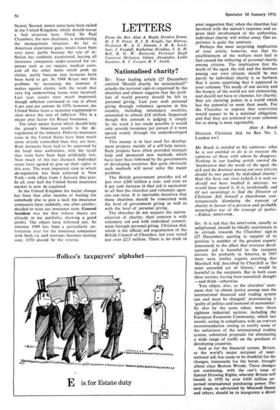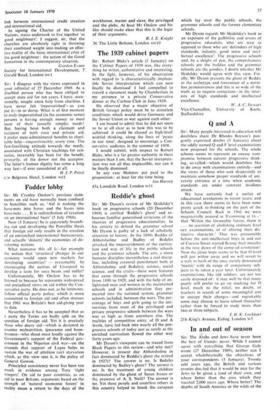LETTERS
From the Rev Alan A. Brash, Gordon Evans, H. J. P. Priest, R. I. E. Knight, Ian Harvey, Professor W. A. C. Stewart, I. H. K. Lock- hart, I. Fendall, Katherine Hondius, J. A. H. Bell, R. G. W. Rickcord, Professor Hugh Cameron McLaren, Sidney Alexander, Leslie Gardner, R. T. Cooper, R. Y. Smith.
Nationalised charity?
Sir: Your leading article (27 December) entitled 'Should charity be nationalised?' attacks the national sign-in onzanised by the churches and almost suggests that the prob- lem of world poverty should be left to personal giving. Last year such personal giving through voluntary agencies in this country, including missionary societies, amounted to almost £16 million. Important though this amount is judging it simply by the work it has made possible it would only provide twopence per person if it were spread evenly through the underdeveloped world.
This money is in fact used for develop- ment projects, mainly of a self-help nature. Such projects have often provided strategic help and pioneered new methods which have later been followed by the governments of developing countries. But quite obviously such methods will never solve the major problem.
The British government provides aid of just over £200 million a year, and even an 8 per cent increase in that aid is equivalent to all that the churches and voluntary agen7 cies can raise. It is inevitable therefore that those churches should be concerned with the level of government giving as well as with the level of personal giving.
The churches do not support the nation- alisation of charity; their concern is with voluntary aid and with individual commit- ment through personal giving. Christian Aid, which is the official aid organisation of the British Council of Churches, last year raised just over £2.5 million. There is no truth in your suggestion that, when the churches feel involved with the nation's response and ex- press their involvement to the authorities, individual charity will wither away. Our ex- perience is quite the contrary.
Perhaps the most surprising implication of your article, however, was that the establishment of the welfare state had in fact caused the withering of personal charity among citizens. The implication that the needs of the aged, the sick and the destitute among our own citizens should be met purely by individual charity is so barbaric that it seems surprising that it appeared in your columns. The needy of our society and the hungry of the world are not clamouring, and should not have to clamour, for charity; they are claiming justice in a world which has the potential to meet their needs. For the Churches to express that conviction would appear to be a minimal obligation, and that they are criticised in your columns for so doing is most regrettable.
Alan A. Brash Director, Christian Aid, PO Box No. 1, London swl
Mr Brash is entitled to his opinions: what he is not entitled to do is to travesty the opinions of those with whom he disagrees. Nothing in our leading article carried the 'implication that the needs of the aged, the sick and the destitute among our own citizens should be met purely by individual charity.' Had this been our view (which it is not) we should not have implied it, anyway; we would have stated it. It is, incidentally, sad (if not surprising) to find the Director of Christian Aid, himself a churchman, con- temptuously dismissing the concept of charity in favour of a perverse and probably meaningless use of the concept of justice. —Editor, SPECTATOR.
Sir: It is sad that the SPECTATOR, usually so enlightened, should be blindly reactionary in its attitude towards the Churches' sign-in (27 December), quoting in support of its position 'a number of the greatest experts' (unnamed) to the effect that overseas devel- opment aid is harmful to the recipient nations. So probably in America in 1947 there were similar experts asserting that Marshall Aid, described by Churchill as 'the most unsordid act of history,' would be harmful to the recipients. But in both cases these nations, having been consulted, thought —and think—otherwise.
You object, also, to the churches' state- ment that `to obtain justice among men the international financial and trading system can and must be changed,' pronouncing it 'guilty of politics and innocent of economics'. So also by the same token, were those eighteen industrial nations, including the European Economic Community, which last month, acting in compliance with an UNCTAD
recommendation aiming to rectify some of the unfairness of the international trading system, submitted proposals for eliminating a wide range of tariffs on the products of developing countries.
And as for the financial system, Britain. as the world's major recipient of inter- national aid, has cause to be thankful for the changes, immensely for the better, brought about since Bretton Woods. These changes
are continuing, with the IMF'S issue of
Special Drawing Rights, whereby Britain will benefit in 1970 by over $400 million un- earned international purchasing power. The next stage, as advocated by Maxwell Stamp and others, should be to inaugurate a direct link between mtemational credit creation and international aid.
In signing the Charter of the United Nations, states undertook to live together 'as good neighbours'. I suggest, sir, that the churches are absolutely right in throwing their combined weight into making an effec- tive reality of the basic international ethic of the good neighbour: the action of the Good Samaritan in the contemporary situation.
Gordon Evans Society for International Development, 7 Gerald Road, London swl
Sir: I disagree with the views expressed in your editorial of 27 December 1969. As a disabled person who has been obliged to accept state aid for ten years, I have, occa- sionally, sought extra help from charities. I have never felt Impoverished'—as you put it—in so doing. What is of first moment to truly impoverished (in the economic sense) persons is having enough money to meet most of their (usually simple) needs! But, having been both a craimant and recipient of both state and private aid, I prefer state-administered benefits to chari- table help—unquestionably, every time. The fast-fossilising attitude towards the needy, associated with Christian teachings for cen- turies, invariably has been for the benefit, primarily, of the donor not the acceptor. The latter's human dignity has come a long way last—if ever considered at all.
H. J. P. Priest c/o Belgrove Hotel, London wcl



































 Previous page
Previous page